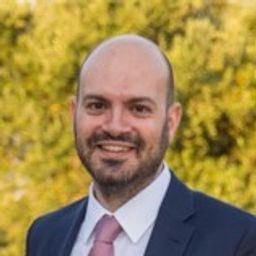
Konstantinos Loupos (M) Head of R&D, holds an MBA (Hellenic Open University, GR), M.Sc. in Microelectronics Systems Design (University of Southampton, UK) with distinction and M.Eng. in Electronic and Electrical Engineering (University of Manchester, UK). He has extensive experience in embedded systems and sensors and microelectronics systems, security systems, IoT technologies and Cybersecurity. His research interests and activities range in Sensors and Systems for Structural Health Monitoring (tunnels, structures, bridges etc), Robotics for Civil Infrastructure Inspection, Security Systems (sensors and communications), Water Demand Management, Monitoring and Leakage Detection, Fiber-Optic Monitoring Systems, Wireless Sensor Networks and Communication Systems and Application Specific Embedded Systems. Konstantinos Loupos has actively and successfully participated in a series (more than 35, in the last 19 years) of EC co-funded projects (FP5, FP6, FP7, H2020, MED, GSRT and other) in the areas of SEC, IST, ICT, SME, NMP, COOP, MED, CBC-MED and TRANSPORT, with significant positions of responsibility (Project Coordinator, Technical Manager, Leader of Development teams etc). He has more than 65 publications in Conference proceedings, Journals and book chapters. He is serving as a formal evaluator (expert) of EC projects in various topics of FP7, H2020, EUKERA/EUROSTARS and MED programmes. Konstantinos Loupos is a certified PMP, Scrum, GDPR expert (Certified DPO), member of EUROPOL EC3 cyber security group and European Cybercrime Center, member of the Secure Platform for Accredited Cybercrime Experts (SPACE), member in the EUROPOL Data Protection Experts Network (EDEN) and active member of the Alliance for Internet of Things Innovation (AIOTI). Currently Konstantinos Loupos is involved into several research projects such as: ERATOSTHENES (Coordination), CHARIOT (Coordination), ICONET (Coordination), PROFILE (ethics expert and DPO), INTERQ (partner) and PILOTING (partner).
Sessions in which Konstantinos Loupos participates
- Identity, trust and privacy in an intelligent, smart IoT World. Challenges and outcomes - Session 1: Trust and lifecycle management in the IoT World Croke Park Conference Centre - Suite 681/682
- 9:00 AM - 10:30 AM | 1 hour 30 minutes
- The Internet and the recent connect...
- Workshop
- Identity, trust and privacy in an intelligent, smart IoT World. Challenges and outcomes - Session 2: AI and ML technologies as enablers for a more secure IoT Croke Park Conference Centre - Suite 681/682
- 11:00 AM - 12:30 PM | 1 hour 30 minutes
- The Internet and the recent connect...
- Workshop
- Identity, trust and privacy in an intelligent, smart IoT World. Challenges and outcomes - Session 3: Trustworthiness and Tailored applications Croke Park Conference Centre - Suite 681/682
- 1:45 PM - 4:00 PM | 2 hours 15 minutes
- The Internet and the recent connect...
- Workshop
Sessions in which Konstantinos Loupos attends
- Next step of security on the edge and in Data Spaces Croke Park Conference Centre - Hogan Mezzanine 2
- 1:45 PM - 3:00 PM | 1 hour 15 minutes
- The truzzt:box uses the on-chip-based Intel SGX:enclave to process and ship data in federated data spaces. It en...
- Panel
- Innovating in the era of Trustworthy AI Croke Park Conference Centre - Hogan Mezzanine 2
- 3:15 PM - 4:30 PM | 1 hour 15 minutes
- Last August 2021 BDVA released his community position to the proposal for AI regulation supporting the idea of balancing between regulation and ...
- Panel
- GIOTS Paper Presentation W1. 4th Workshop on Internet of Things Security and Privacy (WISP) Croke Park Conference Centre - Suite 683/684
- 5:15 PM - 6:30 PM | 1 hour 15 minutes
- Chair: Konstantinos Loupos (INLECOM Innovation, Greece) 5:15 Modelling of Resource...
- Workshop
- IoT and Edge Computing Standardisation Challenges and Beyond Croke Park Conference Centre - Nally Suite
- 11:00 AM - 12:30 PM | 1 hour 30 minutes
- Overall IoT and Edge Computing Standardisation ChallengesPolicy and Regulations on IoT and Edge Computing
- Panel
- Green and Digital Transition: Sustainable IoT and Energy Efficiency at the Edge by CONNECT Croke Park Conference Centre - Suite 683/684
- 1:45 PM - 3:00 PM | 1 hour 15 minutes
- Rolf Riemenschneider (European Commission) – EU perspective challenges related to performing processing in the...
- Seminar
- Advances in IIoT and related techs: IDS, AI, DT, Industrial Metaverse Croke Park Conference Centre - Hogan Mezzanine 1
- 1:45 PM - 3:00 PM | 1 hour 15 minutes
- On April 2022, Elon Musk noted that: “At this point, I think I know more about manufacturing tan anyon...
- Panel